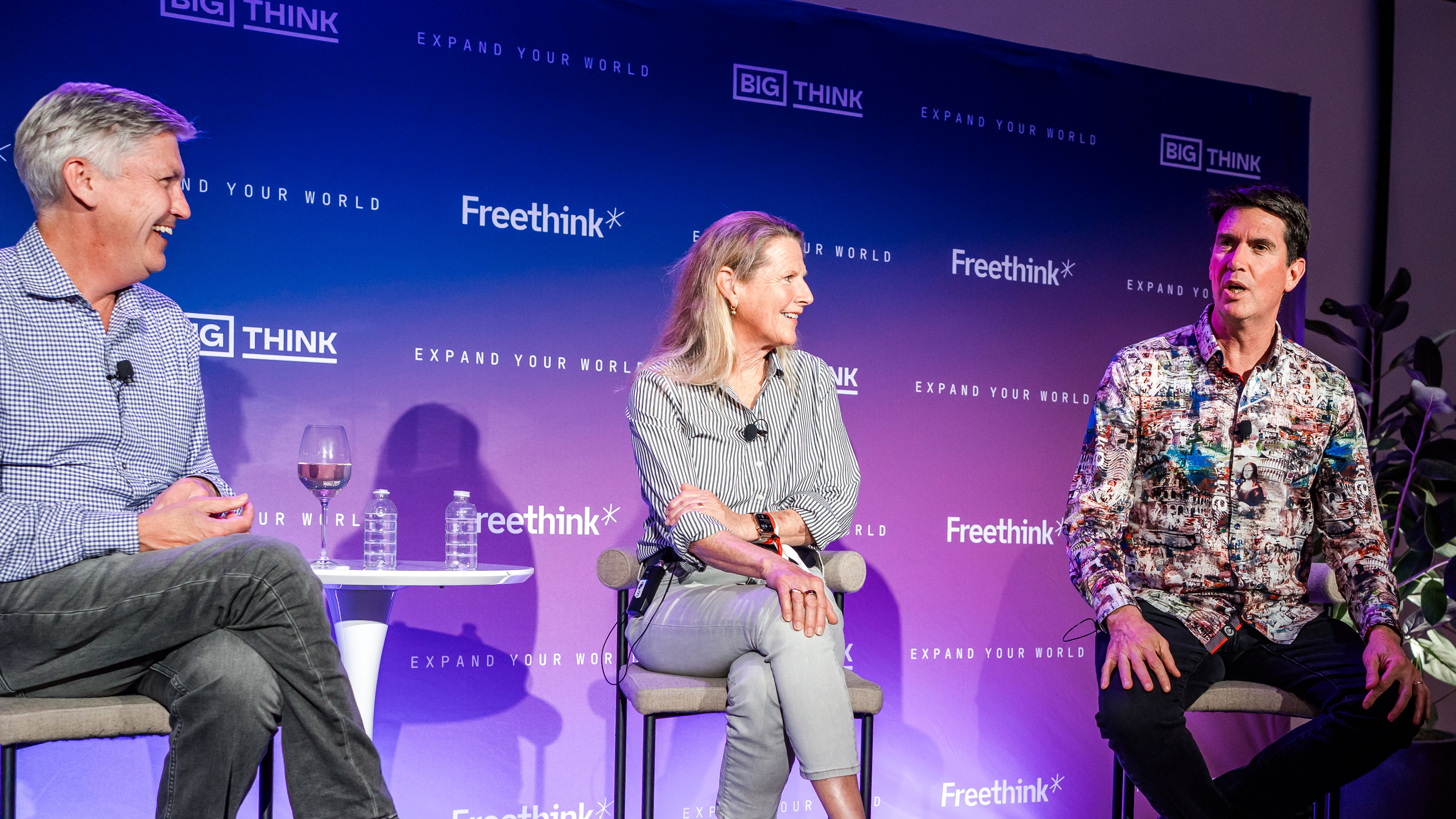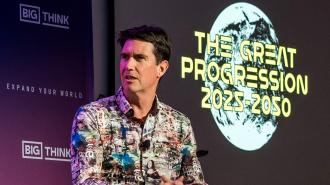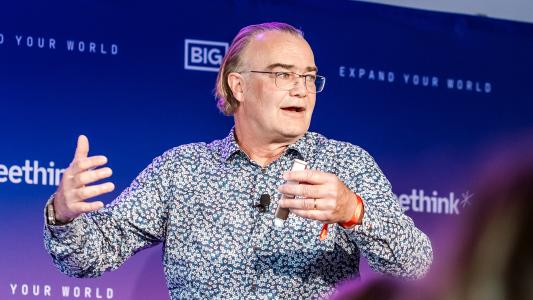On May 29, 2025, Freethink Media brought together visionary technologists, founders, and futurists in San Francisco to explore how breakthrough technologies — from AI to clean energy to synthetic biology — can help reinvent America for the 21st century. Curated by Peter Leyden in partnership with Freethink, “The Great Progression Begins Now” featured bold ideas, dynamic conversations, and a celebration of the innovators shaping what comes next. It was a night to frame the future — and to meet the people building it.
Adam Cheyer, co-founder of Siri and VP of AI Experience at Airbnb, was one of three remarkable guests to take the stage that night. During his conversation with Leyden, he shared his amazement at how generative AI has evolved beyond anyone’s expectations. “The holy grail of common-sense reasoning just… fell out,” Cheyer said, describing how large language models unexpectedly cracked problems that had stumped AI researchers for decades.
In a world of endless noise, Freethink Media creates live experiences that connect, inspire, and transform. Sign up to get notified of upcoming events.
The following transcript has been lightly edited for length and readability:
Peter Leyden: Early days, you’re a founder of Siri. Take us back to AI in those days. What were you trying to do, and what did you expect AI to be like?
Adam Cheyer: This was around 2007. The iPhone had just come out. The search engine was the predominant AI tool that we all used, and with Siri, we just had a very simple thought that: “Wouldn’t it be great, instead of just putting in words and getting back links, if you could actually have a conversation with an assistant that understood you?” We were just trying to get a computer to understand words. Sounds so simple.
I give the example. If I asked Siri: “Book a four-star restaurant in Boston,” immediately, you all know what it means. But if you think about it, well, “book” could not only mean “make a reservation,” it could be the physical book. But did you know “Book” is the name of a city in the United States? And “Star” is the name of a city in the United States. And there are 13 Bostons in the United States. So which city am I talking about?
If you loaded in millions of words and business names and city names, you realize every word in the English language is ambiguous, and the complexities of combining it is much harder than it seems, so those were the things we were wrestling with: Could you, across multiple broad domains, have a computer able to understand you well enough to not only answer a question, but take action?
The original Siri, we called it a “do engine.” You could book and buy. You could call a cab before Uber and just say, “Siri, take me to my restaurant.” You could make a reservation. You could buy the Warriors ticket all through voice. So that was kind of AI in 2007, 2010.
Leyden: Did you think at the time, looking ahead in your career, did you think, “Ah, this is going to take forever,” or “We’ll never get to it”? What did you think?
Cheyer: Just understanding the words was a challenge, but I thought that would be doable at scale. The hard part is common sense. What do you do? How do you execute? OK, I know you want to make the reservation at that four-star restaurant in Boston, but what steps do you have to do? How do you take it?
We know how to do things. We grew up, and we learned every little bit of the world. We know how to operate a computer. We know what a restaurant is. We know how to make a reservation by calling it or clicking. How do we get all of that common sense knowledge, or world knowledge, into a computer? That, I was like, “Wow, that’s the holy grail.”
Computer scientists spent decades trying to type in everything we know. That was not scalable, so I did not know how we would ever get to a system that knew as much as we did.
“It knows every major concept of every major field all at the same time. … Biggest shock of my entire life.”
Adam Cheyer
Leyden: You told me that when generative AI came out, you were totally surprised. What blew you away, and why did it blow you away?
Cheyer: I’ve been an employee working on AI for almost 40 years now, back to the ’80s and expert systems. I kind of had a prediction, or a path, of how the field was going to evolve — we’d get better at this and smarter at that — but generative AI, literally, my mind melted, partly for that common sense piece. What is generative AI? It’s just a word predictor.
It’s like a super autocomplete. If I type, “John hit the,” and [to audience:] say to you — you all say?
Leyden: “Ball.”
Cheyer: “Ball.” Or “wall.” Or “penguin” is probably on the list, but it’s way down. It’s just probabilities, right? How are you going to get this knowledge about how the world works? And I started playing with it, and I realized there’s knowledge there. There’s understanding. It melted my mind.
Leyden: People say that, “Oh, AI doesn’t really understand love.” But you said to me, “It actually does understand love.” Say more what you mean by that.
Cheyer: I came at this with a very technical human bias. I’m like, “Oh, it’s all probabilities. It can write a love poem, generate word by word, an entire poem. But it doesn’t know what love means.” And then I realized I was wrong.
It turns out — after decades of people wondering, “What’s the right representation? How do you type in knowledge or acquire knowledge to know everything that we know?” — by trying to predict the next word, a model of understanding for the entire world, every field, every concept, every relationship fell out as a side effect.
I think even those working in this field had no idea that that was necessary to accurately predict the next word. For me, the holy grail of AI just hopped out, with no one expecting it or really conceiving of it.
So now, does it understand love like a human does? No, it can’t feel. It can’t understand those emotions exactly, but it knows everything about love and what it means. And not only love, it knows every major concept of every major field all at the same time. It has an expert in physics and mathematics and poetry and history and love all at once in one system and a model that can make connections and reason across all of it. Biggest shock of my entire life.

Leyden: I’ve talked to a lot of AI experts. It’s a common experience. [To Cheyer:] Wouldn’t you say, your colleagues? Like everybody says this. So, people who are outside the field, you got to understand how big a deal this is. Very big deal.
Now, going forward, where even in the next five years could we go with this? I know some people are talking superintelligence, all kinds of stuff. You seem to come short of that. Give us your sense of what’s coming and what maybe the limits are on it.
Cheyer: My first conception of what an AI assistant should be like was some 30 years ago, 1993, before I saw my first web browser. I was trying to imagine how people would interact with knowledge and information around the world, and I wasn’t prescient enough to think about webpages and hyperlinks and documents. I thought everyone would have an assistant, and you could say, “I want to know this and do that.”
Now, gen AI gets an A-plus for me on the knowing side. But people come up and say, “oh, ChatGPT is way better than Siri.” I’m like, “Oh, really?” Well, with Siri, I say, “Tell my wife I’m going to be late, and it sends her a message. Does ChatGPT?” “No, no, it doesn’t send the message.” “With Siri, I can say, ‘Play a song,’ or ‘Set a timer.'” “Oh, well, ChatGPT, it doesn’t do things.”
I do think over the next few years, you could make a parallel of how the internet emerged. Remember when pages were static HTML with bad interface? There was this richness that emerged, JavaScript, that not only made them more interactive, the user experience was better, but you could do things. You could book and buy, et cetera, right? Commerce, not just a dumb, static page.
AI today is like the internet, say, ’95. It knows a lot, but the interface needs to improve. It’s like right now we’re at the HTML when it was just the blink tag. Because language, the chat, is not the best way to do most things. Think travel. I don’t want a discussion. I want photos. I want visuals.
It needs to evolve on the doing side, and the final thing missing, which I think will emerge, we need an ecosystem where everyone’s needs are met. The content and service providers, the users — we don’t have that right now. It’s confusing. No one knows what’s SEO for AI. So for me, the next 10 years is not about superintelligence. It’s literally about how this tool, like the internet, evolved in richness, doing, ecosystem. We’re going to see the same thing in AI.
“No matter how smart AI gets, it’s not going to solve all our problems by itself.”
Adam Cheyer
Leyden: You found a lot of different things, and your latest one was in stealth, called Game Planner. We didn’t even know what it was. I couldn’t even know what it was. Brian Chesky, the CEO of Airbnb, bought it, and it was brought in.
I think it had to do with, you were trying to figure out how to do collective decision-making and collective intelligence? Can you talk a little bit of that idea of what AI might be able to help us do that we haven’t been able to do yet?
Cheyer: You’re talking about the Great Progression entering into this period of change, and everyone’s like, “Is super intelligence going to take over everything?” So the first piece is no matter how smart AI gets, it’s not going to solve all our problems by itself. And when I’m talking problems, the big things: energy, hunger, poverty, war, pollution. They’re big, wicked, systemic problems. It’s not going to solve it. We have to do it.
Now, it can be a tool to augment our intelligence. This is an age where we can really do more with AI. But we’re going to do it. You know how the world works. One person can make a little change, but for these big issues, it needs to be collaborative endeavor.
So, what we were working on in stealth on Game Planner — I literally came up with that name for the acquisition press release. We didn’t even have the name internally — we were building tools to help humanity make better decisions together.
We were combining three things, and you can think of it as bringing all the threads of my career together. There was AI. So I did Siri. There was UI, user interface. What’s the right experience for making decisions? And there was CI, collective intelligence.
We were trying to build what we call a “game plan.” Think “PowerPoint for decision-making,” which is an incredibly empty space. If I say “balance a budget,” you think “spreadsheet.” But if I say, “We have an important decision to make. What tool do we use?” Nothing. We were trying to fill that void with a game plan to literally help every individual, every company, every nonprofit, every government come together and work through the biggest problems with the help of AI.
Leyden: Damn, we need you for these next 25 years.
In a world of endless noise, Freethink Media creates live experiences that connect, inspire, and transform. Sign up to get notified of upcoming events.






